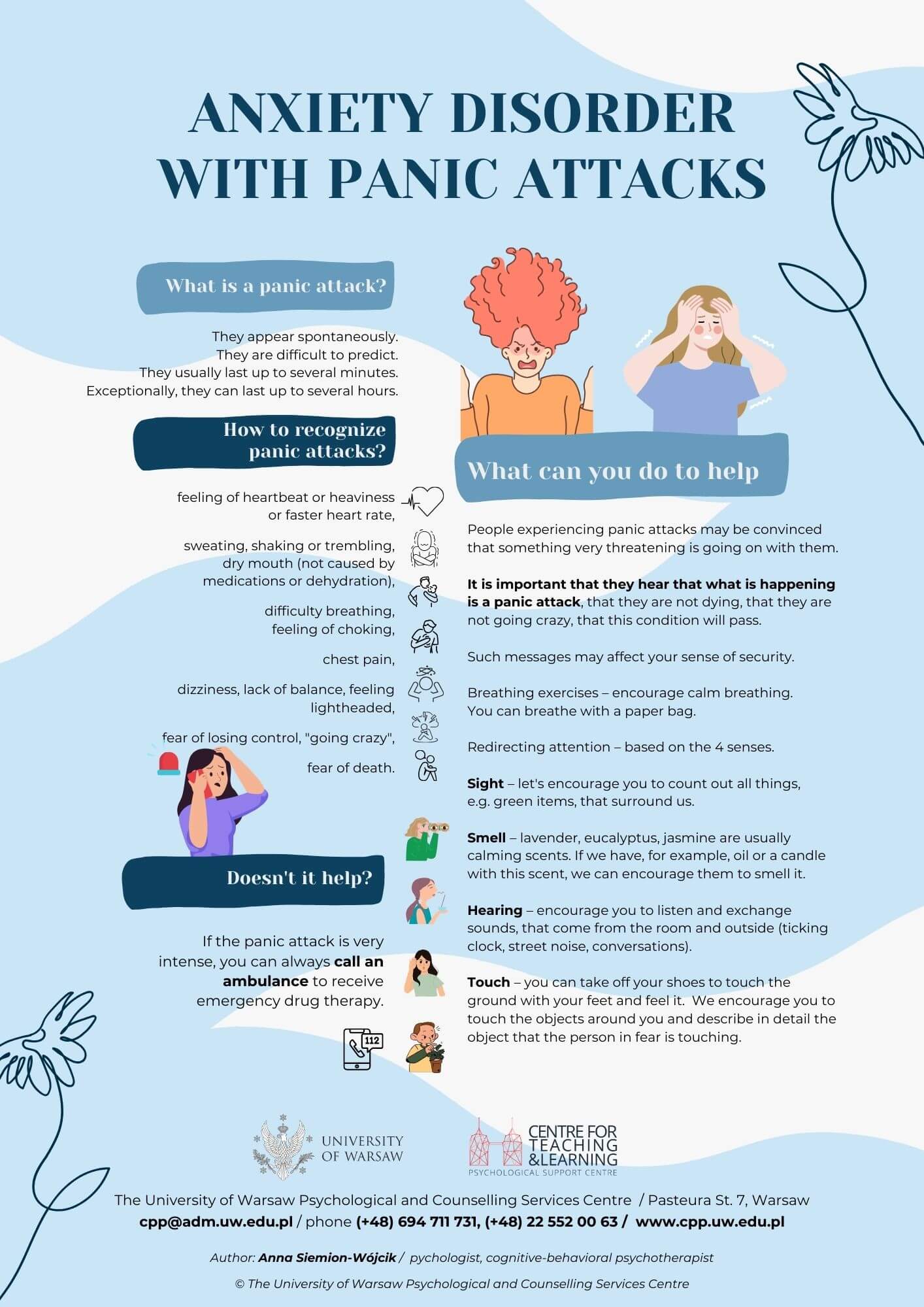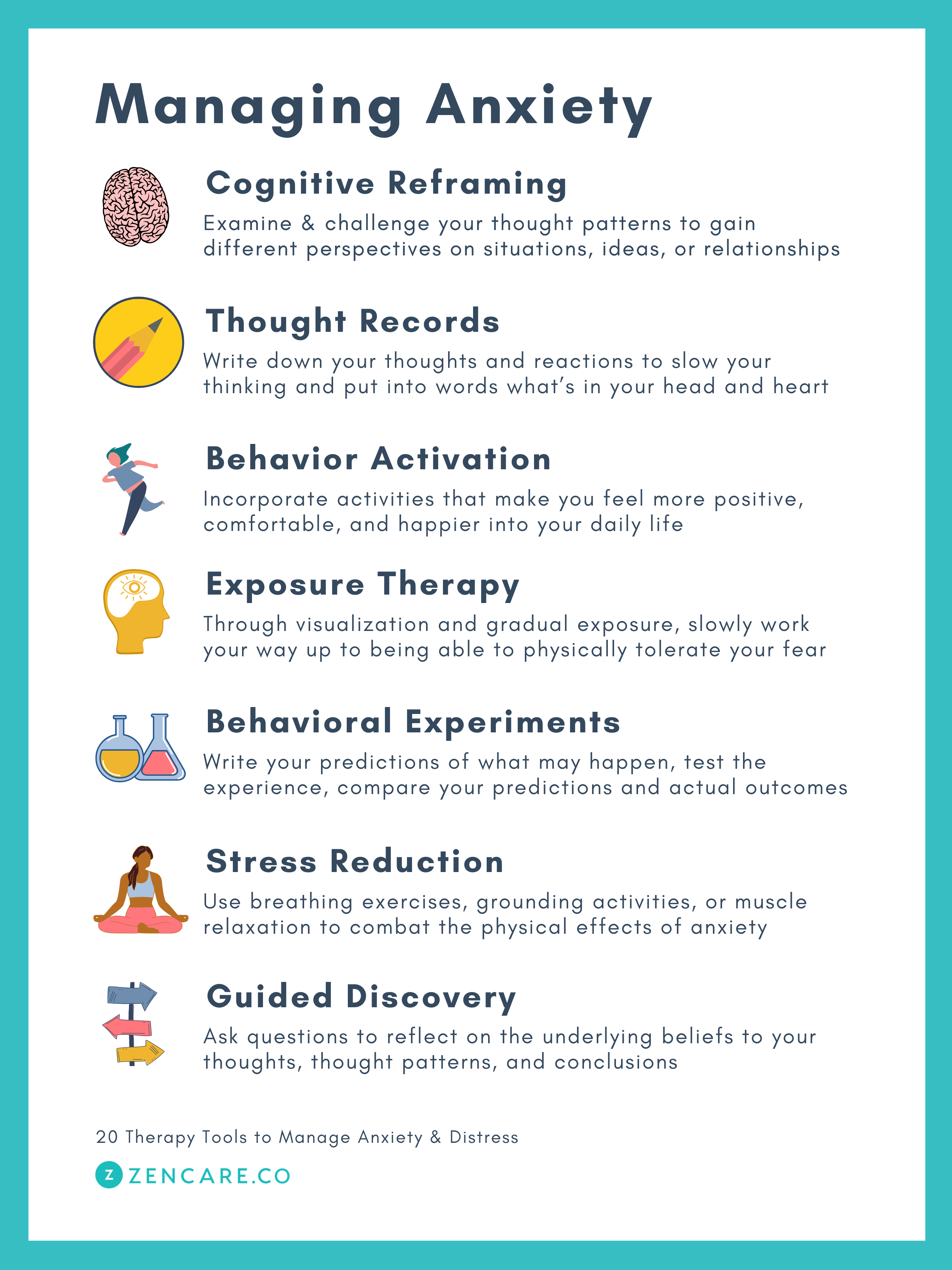Checking Out Different Approaches in Therapy for Stress And Anxiety Disorder for Long Lasting Change
When dealing with anxiety conditions, it's necessary to explore a selection of counseling approaches. Each approach uses special understandings and devices to assist you handle your signs and symptoms efficiently. You could locate that integrating strategies can yield the finest outcomes. Comprehending the subtleties of these approaches is key to fostering long-term change. What if the best combination could launch a new level of psychological wellness for you?
Comprehending Anxiousness Problems: A Short Review
Anxiety disorders, which affect countless individuals worldwide, can greatly impact every day life. You might experience overwhelming feelings of worry or fret that seem unmanageable. These sensations can lead to physical symptoms like a racing heart, sweating, and even wooziness. Common types of anxiety disorders consist of generalized anxiousness problem, panic attack, and social anxiousness problem. Each has unique indicators, but they all share a tendency to disrupt your routine and relationships.Understanding the source of your anxiety is vital. It could originate from genes, mind chemistry, or life experiences. Acknowledging your triggers can help you handle your feedbacks better. It is essential to remember that you're not the only one in this battle. Many individuals encounter comparable obstacles, and looking for assistance is a strong step towards feeling much better. By learning more about anxiety problems, you're already on the course to understanding and managing your problem more effectively.
Cognitive-Behavioral Treatment: Challenging Negative Thought Patterns

Recognizing Unfavorable Thought Triggers
Acknowledging the details triggers behind your negative ideas can be vital in managing stress and anxiety when you run into moments of distress. Start by taking notice of situations that provoke feelings of worry or fear. Is it a crowded space, an approaching due date, or a conversation with particular people? Write down these instances in a journal. This will certainly assist you identify patterns in your thinking. Notification physical sensations that accompany your unfavorable thoughts, like an auto racing heart or rigidity in your breast. By determining these triggers, you get insight right into what's fueling your anxiousness. Recognizing these connections is the initial step in challenging those ideas and ultimately restoring control over your psychological responses.

Replacing Ideas With Positives
Testing negative idea patterns is an important action in changing your state of mind and lowering anxiety. You may usually find yourself caught in cycles of insecurity or disastrous thinking. Instead of letting these ideas determine your sensations, method changing them with sensible choices or positive affirmations. When you think, "I can not manage this," shift it to, "I can manage challenges one step at a time." This easy modification can substantially impact your psychological state. On a regular basis recognizing and responding to these adverse ideas assists produce a much healthier interior dialogue. Keep in mind, it takes some time and initiative, yet consistently exercising this strategy can bring about long-term adjustment, empowering you to encounter anxiousness with restored self-confidence and durability
Building Coping Techniques Together
Replacing adverse ideas is only the beginning of managing anxiety properly. To develop enduring modification, you need to develop coping techniques that encourage you. Cognitive-Behavioral Therapy (CBT) helps you recognize and test those unhelpful idea patterns. Together, you and your counselor can discover exactly how these thoughts effect your feelings and behaviors.Start by creating useful techniques, like journaling or mindfulness workouts, that enable you to challenge anxiousness head-on. When you face your fears progressively, you'll discover to respond in a different way.

Mindfulness and Acceptance-Based Approaches: Cultivating Present-Moment Awareness
As you browse the intricacies of anxiousness, incorporating mindfulness and acceptance-based methods can significantly boost your ability to grow present-moment awareness. By concentrating on the present moment, you'll discover that you can observe your thoughts and feelings without judgment. This technique assists you acknowledge your anxiety without really feeling bewildered by it.Engaging in mindfulness exercises, such as deep breathing, body scans, or guided meditations, permits you to ground on your own in your current experience. Acceptance-based strategies urge you to accept your emotions rather than deal with versus them. When you accept your sensations, they lose their power over you.Incorporating these techniques right into your daily regimen can transform how you react to anxiety. You'll establish durability and find out to navigate difficult circumstances with better simplicity. Inevitably, cultivating present-moment recognition lays the foundation for enduring modification, encouraging you to lead a much more meeting life.
Exposure Treatment: Confronting Anxieties Slowly
Direct exposure therapy assists you challenge your fears in a gradual method, making it much less overwhelming. You'll discover strategies to face anxiety-provoking situations action by action, while also developing coping strategies to manage your responses. This method encourages you to take control and reduce stress and anxiety with time.
Gradual Exposure Strategies
When facing stress and anxiety, progressively facing your worries can be a powerful means to reclaim control. This technique, referred to as gradual direct exposure, entails slowly subjecting on your own to the scenarios or objects that trigger your stress and anxiety. Beginning with less challenging circumstances and progressively function your way as much as even more challenging ones. If you're worried of public speaking, you might begin by talking in front of a mirror, after that advance to sharing ideas with a close friend, and eventually address a tiny team. Each action helps desensitize you to the fear, building your confidence over time. Bear in mind, it's vital to pace on your own and celebrate little victories as you move via this procedure, reinforcing your ability to handle anxiety effectively.
Structure Coping Approaches
Structure effective coping strategies is important for managing anxiousness, particularly as you face your anxieties progressively. One effective method is direct exposure therapy, where you start by facing your fears in a regulated fashion. Start with less frightening scenarios and slowly work your means as much as more tough circumstances. This progressive direct exposure assists desensitize you to anxiety sets off, making them less overwhelming.Incorporate leisure techniques, such as deep breathing or mindfulness, to soothe your mind throughout exposure. Track your progress, commemorating small triumphes along the road to boost your confidence. Keep in mind, it's okay to take your time; the objective isn't perfection but stable improvement. By developing these approaches, you'll equip yourself to browse anxiousness and welcome life a lot more completely.
Psychodynamic Treatment: Uncovering Origin of Anxiousness
Psychodynamic therapy explores the unconscious mind, disclosing the origin of your anxiety - Counseling services for anxiety. By examining your ideas, sensations, and past experiences, this strategy aids you uncover underlying conflicts and unsolved issues that may add to your present anxiousness. You'll deal with a specialist to investigate youth experiences, partnerships, and emotional patterns that shape your actions today.As you get understanding into these deeper layers of your mind, you'll begin to acknowledge how past events affect your present behavior. This understanding can result in catharsis, enabling you to refine feelings you could have suppressed.Through the healing relationship, you can also determine defense systems that may have established with time, supplying a more clear course to change. Inevitably, psychodynamic therapy equips you with the devices to address your anxiousness at its core, promoting enduring change in your emotional health
Integrative and Alternative Approaches: Integrating Methods for Greater Efficiency
Incorporating numerous restorative strategies can improve your trip towards managing anxiousness better. By incorporating elements from cognitive-behavioral therapy, mindfulness techniques, and alternative methods, you can produce a personalized approach that addresses your one-of-a-kind demands. For example, you may use cognitive-behavioral techniques to challenge unfavorable idea patterns while incorporating mindfulness workouts to ground yourself in today moment.Additionally, exploring holistic techniques such as yoga exercise or meditation can advertise leisure and decrease stress and anxiety signs. This mix allows you to establish higher self-awareness and resilience.Experimenting with these varied methods can aid you uncover what resonates most with you. Keep in mind, it's regarding locating a harmony that functions, as opposed to sticking to a solitary strategy. This integrative strategy not only uses immediate alleviation yet also fosters long-term skills for handling stress and anxiety, encouraging you to recover control over your life.
The Function of Assistance Equipments: Structure Durability Through Connection
While it could seem that handling anxiety is a singular trip, having a strong support group can play a vital duty in your strength. Surrounding yourself with understanding friends, family members, or support teams develops a risk-free area where you can honestly share your sensations and experiences. When you get in touch with others, you advise on your own that you're not the only one in this struggle.These partnerships offer encouragement and can give sensible coping approaches that have actually helped others. It's also an opportunity to acquire point of view; buddies can help you see situations differently, minimizing sensations of isolation.Moreover, emotional support promotes a sense of belonging, which can greatly ease anxiety signs. By leaning on your support group, you can build durability and take on obstacles better. Keep in mind, connecting for help signifies toughness, and it can make all the difference in your trip towards handling stress and anxiety.
Often Asked Questions
What Are the Usual Signs And Symptoms of Anxiousness Conditions?
You might experience restlessness, tiredness, problem focusing, irritation, muscle stress, and sleep disturbances. Physical symptoms can include quick heartbeat, sweating, and shivering. Identifying these indicators early can assist you seek proper assistance and treatment.

How Lengthy Does Therapy Typically Last for Stress And Anxiety Problems?
Treatment for stress and anxiety disorders usually lasts anywhere from a couple of weeks to a number of months. It truly depends on your private needs, progress, and the strategies your specialist makes use of to aid you manage your stress and anxiety successfully.
Can Medicine Be Utilized Along With Treatment for Stress and anxiety?
Yes, medication can definitely be utilized together with treatment for stress and anxiety. Incorporating both strategies frequently enhances therapy effectiveness, aiding you manage signs while exploring underlying problems via counseling. Always consult your healthcare service provider for individualized guidance.
Are There Self-Help Methods for Handling Anxiousness?
Yes, there are several self-help techniques for managing anxiousness. You can practice mindfulness, involve in routine exercise, keep a balanced diet regimen, establish a routine, and use deep breathing techniques to help minimize anxiousness signs properly.
How Do I Know if I Required Professional Aid for Stress And Anxiety?
You ought to take into consideration looking for specialist assistance for stress and anxiety if it disrupts day-to-day live, causes substantial distress, or if self-help approaches aren't functioning. Trust fund your instincts; reaching out can cause much better coping skills and assistance. Usual kinds of anxiety disorders consist of generalized anxiousness condition, panic disorder, and social anxiety problem. When you run into minutes of distress, acknowledging the specific triggers behind your unfavorable thoughts can be necessary in taking care of anxiousness. Replacing counselling for anxiety disorder unfavorable ideas is just the start of managing anxiousness properly. By analyzing your thoughts, sensations, and previous experiences, this strategy helps you reveal underlying conflicts and unsettled problems that may contribute to your present stress and anxiety. It's also a chance to obtain perspective; friends can assist you see situations in a different way, lowering feelings of isolation (Counseling services for anxiety).Moreover, psychological assistance cultivates a feeling of belonging, which can greatly alleviate stress and anxiety signs and symptoms